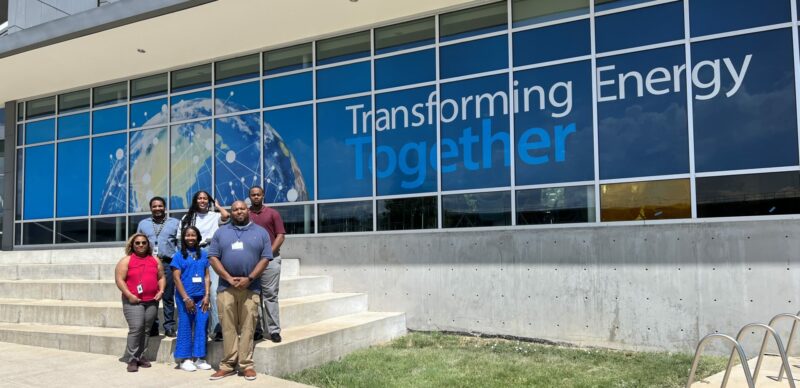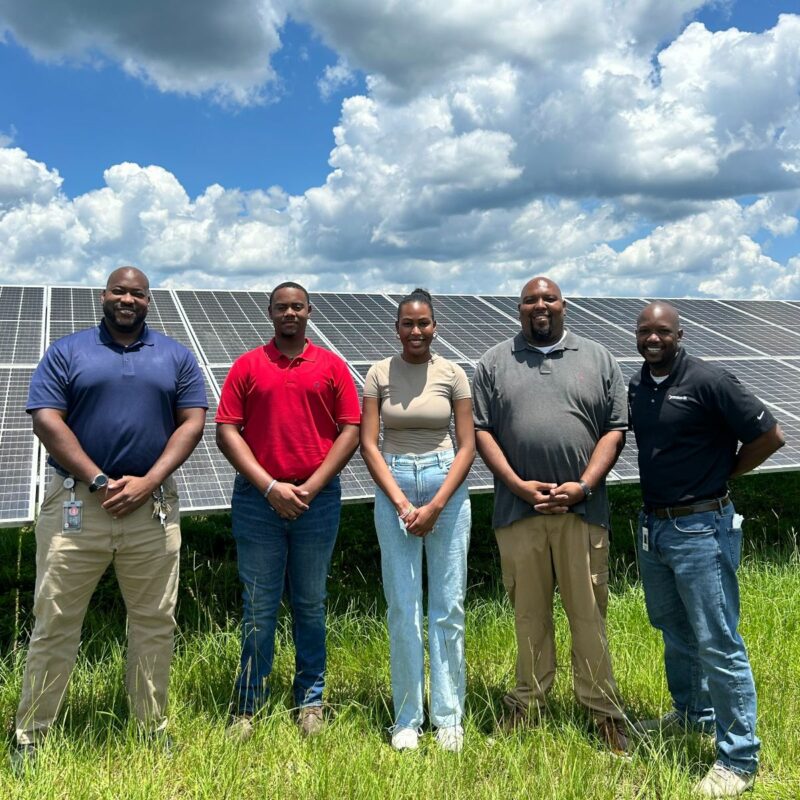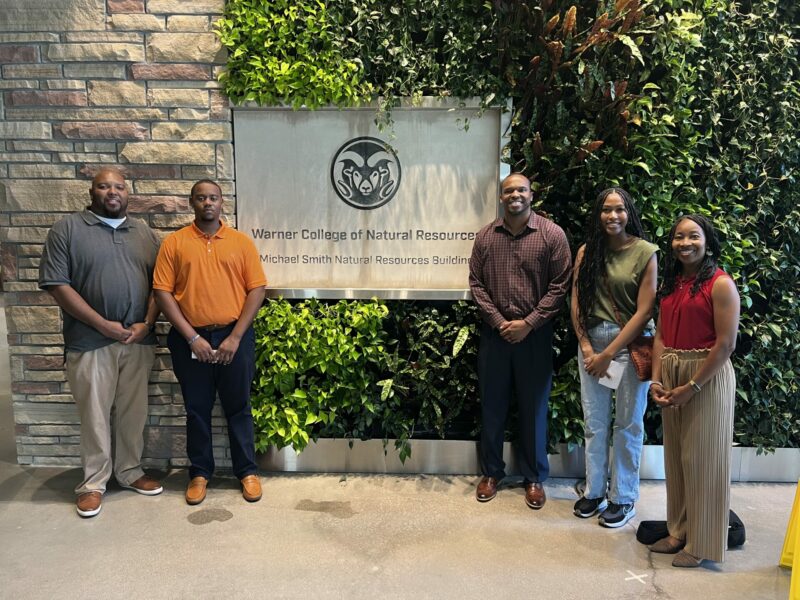La’ Portia Perkins and Julia Worcester

Renewable Energy Interns Haley Williams (top row, center) and Jalen Jones (top row, right) are joined on the tour of the NREL facility by Internship Supervisor Kenneth Leonard (bottom row, right) and NREL administrative representatives.
This summer, the Renewable Energy Wildlife Institute (REWI) hosted its first-ever paid internship program, working in partnership with Fort Valley State University’s (FVSU) Cooperative Developmental Energy Program (CDEP) and Impulse ABT, a consulting company based in Colorado.
Dr. Isaac Crumbly founded CDEP at FVSU, a Historically Black University, in 1983 with seed money from the U.S. Department of Energy. CDEP began as an internship program with the goal of exposing students of color and female students to the energy industry, primarily oil and gas. Over time, Dr. Crumbly recognized that internships are not enough to address the lack of representation in the energy sector. In 1992, he established a STEM dual degree scholarship program with university partners, where female students and students of color at FVSU could spend three years earning a Bachelor of Science degree from FVSU and transfer to a larger institution for another bachelor’s degree. This has evolved into a 3-3 program, where FVSU students earn a Bachelor of Science from FVSU and subsequently earn a Master of Science at the other participating institution.
Upon realizing that he wasn’t receiving enough qualified students with interest in STEM-related fields to fuel CDEP, Dr. Crumbly established a pre-college (9th – 12th grade) math, science, and engineering program to grow the talent base for CDEP. As a result of decades of work and dedication, Dr. Crumbly has effectively created a pipeline for underrepresented students that takes them from 9th grade to careers in the energy industry. For over 40 years, Dr. Crumbly’s program has mentored and educated approximately 1,500 college students and over 900 high school students, and his influence is multi-generational.
Since 1993, CDEP has had an exemplary record of recruiting minorities and women in science and engineering disciplines and exists as a consistent human resources pool that addresses the issue of diversity in America’s STEM workforce.
Impulse ABT was founded by Dr. Benjamin Tuggle, one of the thought leaders in the design of the internship program, an alumnus of FVSU, and Former Assistant Director for Science Applications, U.S. Fish and Wildlife Service. CDEP and Impulse ABT helped recruit and identify highly qualified FVSU STEM students for the REWI Renewable Energy Internship.
The internship was funded through an award received by REWI from the U.S. Department of Energy Solar Energy Technologies Office* to design and construct the SolSource Database (described below). One requirement of the award was to support expanding career and educational opportunities within the renewable energy field for young professionals of color.
FVSU students Haley Williams and Jalen Jones were selected as this year’s interns. Jalen, now a sophomore, is working towards obtaining a bachelor’s degree in agricultural engineering, and Haley, a junior and CDEP scholar, is working towards a bachelor’s degree in mathematics. FVSU appointed Mr. Kenneth Leonard, FVSU alumnus and 8th-grade science teacher at Chattahoochee Hills Charter School, to join Jalen and Haley as their intern supervisor. Mr. Leonard provided onsite supervision, student support, and real-time feedback to the REWI team.
Haley and Jalen supported REWI’s efforts to provide stakeholders with the data and science they need to assess potential risks to wildlife and other natural resources associated with renewable energy development. The interns were essential members of a team working to develop and launch the SolSource Database, a data-sharing infrastructure for solar energy and natural resources datasets that will support project siting for industries and will be reviewed by public agencies. It will also promote scientific research addressing pressing solar energy-natural resource risks, challenges, and opportunities.
During the internship, Haley and Jalen participated in renewable energy career workshops, a field trip to Robins Solar Facility in Georgia, and a trip to the National Renewable Energy Laboratory (NREL) in Colorado.

Marcus Tanner (Georgia Power), Jalen Jones (Renewable Energy Intern), Haley Williams (Renewable Energy Intern), Kenneth Leonard (Internship Supervisor), and Nicholas White (Georgia Power) at the Robins Solar Facility. Brandon Upshaw (Georgia Power, not pictured) also helped lead the tour.
Robins Solar Facility is the largest operating solar facility in Georgia Power’s energy portfolio. The interns traveled with REWI’s senior scientist and project investigator Dr. Josh Ennen, who arranged meetings with staff onsite, and the interns learned about fixed tilt, single and double-axis solar trackers, pre-construction activities, permitting, regulatory challenges, and energy storage. For their final field trip, the interns flew to Denver, Colorado to tour NREL and Colorado State University’s (CSU) Warner College of Natural Resources. On the NREL tour, they saw how research, engineering, and data science collaborate to launch renewable energy developments from ideation to power generation. At CSU, Jalen and Haley met with faculty and staff and learned about graduate school and research programs around wildlife conservation, ecology, and other natural resources.
In providing an array of experiences specific to renewable energy (solar) development, hosting trips with career professionals of color, and having active space for inquiry, mentorship, and guidance, the internship proved essential in reframing and increasing understanding of solar energy.

Dr. Rickey Frierson (to the right of the plaque), of the CSU Warner College of Natural Resources, led a tour of the CSU campus for the Renewable Energy Interns.
Given the stark disparities in the clean energy workforce, where only eight percent of clean energy workers are Black, compared with 13 percent economy-wide, REWI and our partners have been uniquely positioned to make progress in this arena. “Collaborating with REWI on this project will be an excellent opportunity for students to gain knowledge and experience about renewable energy. Introducing underrepresented students to solar energy technologies and the impact those technologies have on the environment is critical to moving forward safely with various sources of renewable energy,” said Dr. Crumbly. Efforts like this are a step in the right direction by providing direct access that influences early career professionals to see themselves in these industries and careers. It is particularly important in a region like the Southeast – where the clean energy transition is accelerating rapidly – that these current disparities are addressed so that Black and brown communities do not go unheard and are uplifted in this next economic and environmental expansion.
* The U.S. Department of Energy Solar Energy Technologies Office supports early-stage research and development to improve the affordability, reliability, and domestic benefit of solar technologies on the grid. Learn more at energy.gov/solar-office.